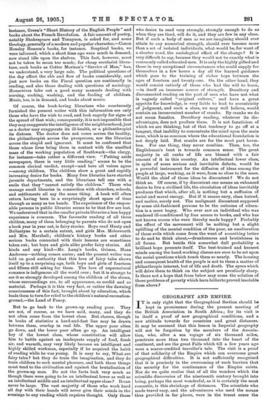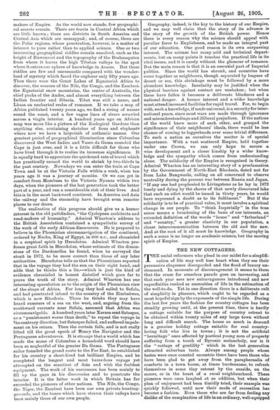I T is only right that the Geographical Section should be
kept in prominence during the present meeting of the British Association in South Africa ; for its visit is in itself a proof of new geographical conditions, and a new attitude towards far countries and great distances. It may be assumed that this lesson in Imperial geography will not be forgotten by the members of the Associa- tion, who, after a sea voyage of six thousand miles, penetrate more than two thousand into the heart of the continent, and see the great Falls which till a few years ago were a scarce-credited traveller's tale. The visit is a proof of that solidarity of the Empire which can overcome great geographical difficulties. It is not sufficiently recognised that it is precisely in the overcoming of such barriers that the security for the continuance of the Empire exists. Nor do we quite realise that of all the wonders which the scientific discoveries of the nineteenth century brought into being, perhaps the most wonderful, as it is certainly the most romantic, is this shrinkage of distances. The scientists who made travel easy, and the adventurers who used the means thus provided in far places, were in the truest sense the
makers of Empire. As the world now stands, few geographi- cal secrets remain. There are tracts in Central Africa which are little known ; there are districts in South America and Central Asia which are unmapped ; and, of course, there are the Polar regions, whose penetration, however, is a matter of interest to pure rather than to applied science. One or two interesting geographical riddles remain unsolved, such as the height of Ruwenzori and the topography of the Brahmaputra from where it leaves the high Tibetan valleys to the spot where it enters our sphere of knowledge in Assam. But these riddles are few and unromantic compared with the wonder- land of mystery which faced the explorer only fifty years ago. Then there were the Great Lakes of Equatorial Africa to discover, the sources of the Nile, the Congo, and the Zambesi, the Equatorial snow mountains, the centre of Australia, the chief peaks of the Andes, and almost everything between the Indian frontier and Siberia. Tibet was still a name, and Lhasa an uncharted realm of romance. If we take a map of Africa published twenty years ago, we find a string of names round the coast, and a few vague lines of rivers scrawled across a virgin interior. A hundred years ago an African map was more like a picture of the Zoological Gardens than anything else, containing sketches of lions and elephants where now we have a labyrinth of authentic names. Our greatest period of geographical illumination since Columbus discovered the West Indies and Vasco da Gama rounded the Cape is just over, and it is a little difficult for those who have lived through it to realise its immense significance. It is equally hard to appreciate the quickened rate of travel which has practically caused the world to shrink by two-thirds in the past century. Nowadays we can enter the train at Cape Town and be at the Victoria Falls within a week, when ten years ago it was a journey of months. Or we can get in comfort from Mombasa to the Victoria Nyanza within two days, when the pioneers of the last generation took the better part of a year, and ran a considerable risk of their lives. And this is in the most backward continent. In America and Asia the railway and the steamship have brought even remoter places to our doors.
The realisation of this progress should give us a keener interest in the old pathfinders, "the Cyclopean architects and road-makers of humanity." Admiral Wharton's address to the British Association contained a sympathetic survey of the work of the early African discoverers. He is prepared to believe in the Phoenician circumnavigation of the continent, ordered by Necho, King of Egypt, in 600 B.C., and chronicled in a sceptical spirit by Herodotus. Admiral Wharton pro- fesses great faith in Herodotus, whose estimate of the dimen- sions of the Dardanelles he found, when he surveyed the strait in 1872, to be more correct than those of any later authorities. Herodotus tells us that the Phoenicians reported that in the voyage they had the sun on their right hand, and adds that he thinks this a lie,—which is just the kind of evidence chronicled in honest disbelief which goes far to prove the truth of the story. Admiral Wharton has one interesting speculation as to the origin of the Phoenician view of the shape of Africa.. For long they had sailed to Sofala, and had penetrated inland to the country of the Zimbabwes, which is now Rhodesia. There be thinks they may have heard rumours of a sea on the west, and, arguing from the southward currents near Sofala„ assumed that Africa was circumnavigable. A hundred years later Xerxes sent Sataspes, as a "punishment worse than death," to repeat the voyage in the contrary direction, but Sataspes failed, and suffered impale- ment on his return. Then the curtain falls, and is not really lifted till the great epoch of Henry the Navigator and the Portuguese adventurers. It is strange that a world which has made the name of Columbus a household word should have been so neglectful of the greater Da Gama. The Portuguese sailor founded the grand route to the Far East, he established for his country a short-lived but brilliant Empire, and he completed the longest and most hazardous voyage yet attempted on the scantiest of data and with the feeblest equipment. The work of his successors has been mainly to fill up the gaps in his discoveries and to penetrate the interior. It is the latter work in which Britain has far exceeded the pioneers of other nations. The Nile, the Congo, the Niger, the Zambesi have been our own private hunting- grounds, and the bones which have strewn their valleys have been mainly those of our own people. Geography, indeed, is the key to the history of our Empire, and we may well claim that the story of its advance is the story of the growth of the British power. Hence there is every reason why the science should appeal with peculiar force to Englishmen, and be made an integral part of our education. One good reason is its own surpassing interest. The science has many arid and technical depart- ments, but on many points it touches the practical life in its vital issues, and it is rarely without the glamour of romance. But the main reason is that it is an essential part of Imperial politics. Since the world has shrunk, and countries have come together as neighbours, though separated by leagues of desert or sea, this shrinkage must be followed by a more Oundant knowledge. Insularity may be justified when the physical barriers against contact are unshaken; but when these have fallen it becomes a deliberate blindness and a national danger. A keener interest and a wider knowledge must attend increased facilities for rapid travel. For, to begin with, such a knowledge, if made universal, is a security for inter- national peace, since most wars are made through ignorance and misunderstandings and illiberal prejudices. If the nations of the world knew more of each other, and grasped the significance of their neighbours' ideals, there would be less chance of coming to loggerheads over some trivial difference. To such a nation as ourselves the matter is of special importance. With a vast scattered Empire, held together under one Crown, we can only hope to secure a wise development and a closer kinship by a wider know- ledge and the sympathy which comes from understanding alone. The solidarity of the Empire is recognised in theory. Admiral Wharton has an interesting story of a proclamation by the Government of North-East Rhodesia, dated not far from Lake Bangweolo, calling on all concerned to observe neutrality during the present war between Russia and Japan. "If any one had prophesied to Livingstone as he lay in 1873 lonely and dying by the shores of that newly discovered lake that such an edict would be issued in thirty years, he would have expressed a doubt as to its fulfilment." But if the solidarity is to be of practical value, it must involve a spiritual change in our people. To "think Imperially" in the true sense means a broadening of the basis of our interests, an extended definition of the words " home " and "fatherland" and "country," a greater elasticity in our population, a closer intercommunication between the old and the new. And at the root of it all must lie knowledge. Geography in such a sense is no longer an academic science, but the moving spirit of Empire.
THE NEW COTTAGERS.



































 Previous page
Previous page